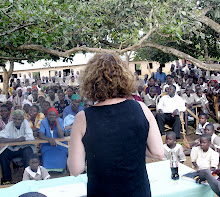For many Africa remains a grumbling puzzle. So often people in more developed countries shake their heads and want to forget the Continent exists. Or they figure that Africans get what they deserve. I heard the other day, a fellow worker in Africa, tell me that in some ways she missed Colonialism. "At least," she said, "the farms were well kept, and people were fed". While in fact that is true, the real point for me is that we were once a nation struggling to figure out democracy. (Indeed we still are) but back then we didn't have instant communication. We didn't have countries threatening to settle our squabbles, so we had to figure it out for ourselves. The same is true for the Continent of Africa. As free peoples they are still in their infancy and their growing pains are difficult to watch. I believe, though, that only by their wanting something different and fighting for it themselves will they truly achieve the freedom they so richly deserve.
I loved this Editorial in Today's Nation Newspaper and thought I would share it with you. Clearly it elucidates the challenges far better than I.
The Nation 9 February 2008
NEWS EXTRA
Kenya's crisis and challenges of democracy in Africa
Story by NYAGA MUNYI
Publication Date: 2/9/2008
Africa’s democratic honeymoon is fast coming to an end, and Kenya’s sudden drift into chaos is a wake-up call across the continent for a more concerted investment in governance programmes. After a decade of democratic gains, Africa now finds itself in a marshland, and Nigeria, Kenya and even South Africa are in a defining moment. The next five years will mark a watershed in the continent’s democratic consolidation.
The violence in Kenya due to political discontent brings into sharp focus the challenges of democracy in Africa and the need for heterodoxity in political governance among African governments and institutions working “to promote democracy” in Africa.
The situation in Kenya exposes the fragile nature of the country’s democracy and points to the role the international community should play in developing African politics which, like its music, moves in sweeping waves.
The 1960s brought independence, and the ‘90s democratic transition and the vanquishing of strongmen. In the 2000s, Africa is going through another defining period – a moment of democratic disillusionment. Between 2004 and 2009 many African states should be commemorating a period of democratisation. Following the defeat, death or overthrow of many “strongmen” in the 1990s, African countries have had a decade of fairly good participatory democracies — South Africa since 1994, Kenya since 1992, Cote d’Ivoire (1993), Zambia (1991), Malawi (1994) and Nigeria (1999).
In the 2000s, however, Africans are questioning the functional utility of democracy beyond participation. There is simmering frustration over the value of democracy, particularly in spurring economic growth and mending the continent’s ethnic rifts.
Several issues plague democracy in Africa. For instance, African political parties lack a distinct policy orientation. In the 1990s a lot of development cooperation funds from international organisations, foundations and development agencies went into funding opposition parties with the myopic intention of deposing African dictators.
The emerging leaders were intoxicated by the virtues of multiparty democracy. Yet upon the exit of the “strongmen” the parties have not evolved mature, clear and distinct cleavages in matters of policy and ideology. As a result ethnocentricism has become the clearest cleavage. Beyond the acquisition of government the parties lack any binding and unifying vision.
African leaders have been slow in recognising the changing relationship between democratic expansion and economic growth. In the 1990s liberal democracy and neoclassical economics were cited as the ultimate and inseparable solution to socio-economic development.
While African economies are growing, largely propelled by rising commodity prices, its politics is shaky, stymied by low socio-economic development and rampant unemployment. It is worth noting that three of Africa’s small and economically progressive countries — Uganda, Gabon and Rwanda — are ruled by soft authoritarian regimes.
Africa’s democratic march has been unresponsive to the exigencies of economic growth and those countries whose leaders have appreciated the trade-offs between economic growth and democratic consolidation are doing better.
Africa faces a huge challenge in the reconciliation of national identities and ethnic identities; national interests and ethnic interests. Unlike such homogenous countries as South Korea or Japan, African states are multi-ethnic with weak and fluid national identities. Genuine ethnic interests are difficult to tell and irrational ethnic loyalties difficult to break. Presidential elections tend to raffle these ethnic grievances.
Thus, the democratic disillusionment has produced two major trends in African politics, which will complicate the continent’s democratic development in the next decade — the ethnic and the socialist appeals.
These trends reflect responses to a sense of economic exclusion where ordinary people feel that the political institutions are not aptly responsive to their problems.
The trends are best demonstrated by events in the three African “pillar” countries — South Africa, Nigeria and Kenya. The recent elections in Kenya and Nigeria highlight an ethnic appeal.
Mr Munyi is a development researcher for the Seoul-based Consulting and Research Institute.
Friday, February 8, 2008
The Challenge Of Democracy
Labels:
Africa Politics Kenya
Subscribe to:
Post Comments (Atom)




No comments:
Post a Comment